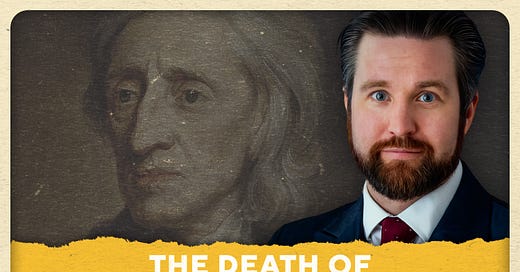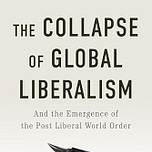I really enjoyed this conversation with Philip Pilkington. Philip, a macroeconomist, researcher on foreign affairs and foreign policy, think tank fellow, and author of the forthcoming book, The Collapse of Global Liberalism, is intellectually agile, knowledgeable, and thoughtful. Especially because we disagreed, his insights into liberalism’s collapse and its global fallout made for a lively and thought-provoking exchange.
We begin by discussing global liberalism, what it is and what comes next. From Lockean theory, liberalism is grounded in the idea that “all social relationships should be mediated by contracts”. Liberalism thus encompasses the idea that everything is a contract. Philip talks about two cool, nearly identical concepts: Contract proliferation and contract inflation. He gives the examples of trans, (he brought this up, not me), and consent contracts for sexual relationships.
These are examples of a proliferation of contracts that far extend the original purview of the contract, the purpose of which is to preserve individual liberty. But contracts have become subject to concept creep, and encompassing (or dare I say colonizing) ever greater aspects of our lives.
We both agree that a seismic shift in the world is occurring. But are we entering a post-liberal future? Philip thinks we are. He envisions a shift away from contract-based individualism toward pre-liberal values rooted in Greco-Roman traditions or Christendom, though I remain unconvinced. On his rendering of history, we’ll get back to Greco-Roman values and Christendom. He argues that much of the world is already post-liberal: India. China. Russia. Turkey. They’re on the cusp of reverting back to their pre-liberal structure.
That liberalism has an inevitable telos—self-destruction—is a fascinating if macabre idea. Collapse, Philip argues, is the inevitable endpoint of liberalism. We see the seeds of that now with low birth rates, mass migration, unconstrained debt, and the legitimacy crisis (the lack of trust in institutions).
Other Interesting Ideas:
“Nuclear power is old cold war propaganda. The best psyop ever pulled was the Soviet psyop that ended up greening Europe.”
“GDP goes up when I pay for an OnlyFans model but not when I have sex with my wife.”
“The productivity of a haircut hasn’t increased since ancient Rome.”
Two Specific Things I Learned:
#1
Robert Solow | Robert Solow's Productivity Puzzle
Robert Solow's Productivity Puzzle describes the paradox where massive investments in information technology (IT) during the late 20th century did not yield expected productivity gains. In 1987, Solow noted, "You can see the computer age everywhere but in the productivity statistics," highlighting the absence of economic output growth despite widespread computer adoption. From the 1970s to mid-1990s, productivity in the U.S. and other developed economies stagnated, puzzling economists who anticipated efficiency boosts from IT. Proposed explanations include measurement errors, as digital goods’ value was underestimated; time lags, as firms needed to adapt to new technologies; and uneven benefits across sectors.
The puzzle underscores challenges in measuring technology’s economic impact and remains a critical lens for studying digital transformation and productivity dynamics. This puzzle ties into our discussion on liberalism’s limits, as it questions whether technological progress can sustain liberalism’s economic promises.
#2
Nicholas Kaldor | Kaldor’s Law of Economic Growth
Kaldor’s Law, proposed by Nicholas Kaldor, links industrial growth to economic development through three propositions.
First: Manufacturing growth drives GDP growth, acting as the economy’s engine by boosting demand across sectors. Second (Verdoorn’s Law): Manufacturing productivity rises with output due to increasing returns to scale, enabling technological advancements and economies of scale. Third: Manufacturing absorbs labor from less productive sectors like agriculture, raising overall productivity through structural shifts.
Kaldor’s Law underscores manufacturing’s role in fostering technological progress, productivity, and labor reallocation, making industrial policies vital for sustained growth. Critics argue its relevance may wane in service- or resource-driven economies, but it remains influential in development economics. Kaldor’s focus on manufacturing highlights structural weaknesses in liberal economies that Philip sees as hastening its collapse. Frankly, I don’t know enough about it to know if he’s correct.
Philip is a deep dude. I hope you enjoy our freewheeling conversation.
- Peter
* Note, unfortunately, there were camera issues and we only have audio. Apologies.
To receive new posts and help support us, please consider becoming a free or paid subscriber.
Find Philip Pilkington:
Host of the Multipolarity Podcast: @MultipolarPod.
Follow Philip on X: @philippilk
Follow Philip on Substack: https://substack.com/@macrocosm









Share this post